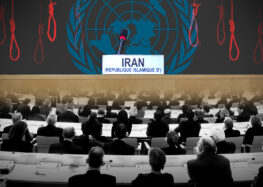Latest State Action Against Telegram in Iran Slows Access, Doubles Cost for Iranians

The latest move by the authorities in Iran against the messaging app Telegram, used by some 40 million Iranians, has resulted in disruptions in access, slower speeds and higher costs for the popular app. This move follows a string of state actions over the last few weeks designed to push Iranians away from the use of Telegram and toward domestic, state-controlled messaging apps.
On April 26, Iran’s state-owned Telecommunications Infrastructure Company (TIC) announced in a statement that based on an order from the secretary of Iran’s Supreme Cyberspace Council (SCC) “the legal license issued in 2016 to install Telegram CDNs [content delivery networks] in Iran has been canceled and annulled.”
CDNs are caching servers that allow faster delivery of multimedia data. Removing Telegram from Iran’s CDNs will slow down access to audio and video content on Telegram. It will also double the cost for Iranian users, who will now have to pay the higher internet rates for foreign traffic that the government set in December 2017 (against net neutrality principles).
According to state authorities, Telegram was being carried on CDNs in Iran based on a joint agreement between Telegram and the Iranian government, which has now been scrapped because the foreign app allegedly failed to meet these commitments. No elaboration has been given about Telegram’s ostensible commitments to the Iranian government.
So far there has been no response from Telegram regarding the Iranian government’s latest action.
Tension has long been growing between Telegram and the authorities in Iran, who have become increasingly hostile to communication platforms that they cannot control. Telegram has repeatedly refused to accept demands by the authorities in Iran to censor content that is within the bounds of freedom of expression.
With the accelerated implementation of Iran’s National Information Network (NIN), the government’s abilities to control internet use in Iran significantly increased. The NIN allows internet traffic to be divided into domestic and foreign traffic. Iranians are offered domestic access at half price in order to discourage them from accessing sites and apps based abroad that do not comply with the Iran’s censorship rules.
In its statement, the TIC made it clear that from now on Telegram would be routed through international channels “that could consequently reduce the quality of access to this messaging service.”
A Tehran resident who spoke to the Center for Human Rights in Iran (CHRI) on April 26 about the impact of TIC’s action against Telegram said current access speeds on Telegram were inconsistent.
“For example, it took two minutes to download a 3.7 megabyte file from the Vahid Online channel and the same amount of time to download a 9.8 megabyte file,” the resident said on condition of anonymity.
President Hassan Rouhani’s media adviser Hesamoddin Ashena tweeted on April 26: “The license to install CDN servers for Telegram has been annulled and its traffic will be routed only through the country’s international channels. The facilities provided to Telegram were based on a conditional agreement but now that the network’s founder has failed to act on his commitments, there’s no reason to continue.”
Ashena did not explain what the agreement was or elaborate on Telegram’s commitments.
This move follows other state actions in recent weeks to pressure Iranians into migrating from Telegram to domestic messaging services which the state can control, censor and access.
Last week Supreme Leader Ayatollah Ali Khamenei along with other officials and state bodies deactivated their channels on Telegram as a step toward the final goal of banning the network and helping domestic competitors absorb members whom they hope will leave Telegram.
The authorities also recently issued orders banning the use of Telegram for official government purposes.
Meanwhile Alireza Rahimi, a member of Iran’s Parliament revealed on April 24 that a team of Iranian officials led by an unnamed cabinet minister had traveled to Russia, which has aggressively sought to block Telegram, to discuss ways to block the messaging app in Iran.
Shargh newspaper reported on April 25 that the legislature was considering blocking messaging apps that did not have an operating license in Iran. It added: “If the plan goes through, opening channels on blocked messaging apps would become a crime.”
In July 2017 CHRI issued a statement warning about “potential disruptions that could occur” following the installation of CDNs for Telegram in Iran.






